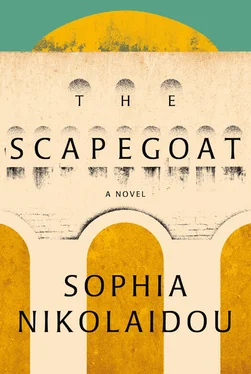— Tomorrow. Tomorrow, together.
GRIS
Grandpa Dinopoulos had a habit of falling asleep in his armchair. Elena would fluff the pillows on his untouched bed, and dutifully changed the sheets, but he always greeted the dawn from his spot in the living room. During the early years of his marriage with Froso he would lie down and wrap his arms around his wife, listen to her heart beating in the silence of the night. Then he would turn onto his stomach, burrow under the covers, and bury his face in the pillows. His sleep was a lonely affair. Froso would search out his feet in the night, tangle her legs in his. He, meanwhile, would be solving cases and resolving loose ends in his dreams, and sometimes he would leap out of bed to jot down some note to himself, and Froso would complain, You never relax .
When the Gris case fell to him, his sleep became even more troubled. Particularly after the night when the district attorney knocked on his door. He knew that taking the case was the right thing to do, that he was saving a man from the firing squad. That was the bitter truth. He believed time would take care of things, that the storm would pass, the political situation would settle down, and a retrial might then yield a better result. It was perfectly clear that the confession was false, the evidence fabricated; everything about the case was an insult to the intelligence, particularly to that of the lawyers. Even if they had expressed the opinion that Gris (the defendant , as the legal documents had it) knowingly and purposefully collaborated with those who committed the crime, both before, during, and after its execution .
The deviations from procedure were obvious, the professional negligence of the lawyers and judges was impossible to miss, and yet the district attorney’s office saw nothing, heard nothing, understood nothing.
And when Gris was sentenced to life in prison — an indication to those in power that the country had managed to avoid the worst, had punished the wrongdoer, had put its best face forward and acted properly — rather than transferring the prisoner to the jail, they kept him in the holding cells of the General Security Police, under Tzitzilis’s keen eye. There, many prisoners , momentarily escaping the notice of their guards, rush to the window and hurl themselves out. Others, shouting and shrieking, cause bruises and cuts on their own persons, with the aim of exposing the defenders of our nation to calumny .
Whether in prison or in a holding cell, the years passed. Gris served his sentence and was released. Appeals for a retrial were constantly being filed. Lawyers introduced new evidence in attempts to prove the obvious. 1977, 1999, 2002, and 2006: four appeals, all rejected. The judges demonstrated evident solidarity with their colleagues. The new arguments were sent back and the verdict stood, as did the flawed documentation, written in katharevousa or in demotic Greek — but though the language changed, no one dared touch the content. Those who disagreed, who felt the case damaged the country’s reputation and offended the sense of justice they held so dear, distanced themselves, sometimes silently and sometimes with a fuss, from the committees, resigned from the bodies that made the relevant decisions. It didn’t matter: they were the minority, their opinion never determined the outcome.
Over the years Dinopoulos realized that good intentions are worth nothing, actions are what matter. Gris was released and Dinopoulos went to see him. The man’s emotions seemed raw, tears came easily to his eyes, he spoke with his soul in his mouth from the very first phrase. After twelve years behind bars, he wouldn’t rest unless his name was cleared. He could forgive the suffering, but not the injustice.
The lawyer, who knew that justice is won and lost in first impressions and that words matter only when they’re written, shaped the appeal with mastery and patience, yet it didn’t have the result they had hoped for.
Gris died without finding justice. And Dinopoulos was no longer sure whether he’d acted rightly back when he made his decision. What he did know was that he couldn’t have acted otherwise.
What’s done is done. One man was sacrificed to save a country. All that nonsense about the pursuit of justice was better left to a student essay. The machinery in place was all-powerful. Whoever believed otherwise probably hadn’t lived long enough to know better.
FANI
— Fine, I understand your not being on Facebook, you think it’s childish. But Skype is totally different, I’ll be able to see you when we talk. I don’t understand why you’re so resistant, I’d even find someone to set it up for you. You wouldn’t have to lift a finger. You’re acting like a crotchety old man, you know that, right?
Fani had been trying to convince Marino to join the present moment for a while. The stone age had ended, he couldn’t just ignore advances in technology. At least not the ones that made life easier and more enjoyable. Marinos dug his heels in like a mule. I don’t have time , was his excuse, I don’t have time to waste on things like that . And when she, who wasn’t one to beat around the bush, asked him straight out, You mean you don’t want to see me when we talk? , he answered, in a tight voice but sure of his response, No . And while he could still hear her breathing on the other end of the line, he hurried to add:
— It’s not enough for me. Screens aren’t real, Fani. Don’t mess with things. Leave them how they are.
Fani let it go.
She sent him a plastic yellow duck, by courier in a bubble envelope. It was the duck Nikolas used to have in the bathtub when he was little. It had a big round belly, so it wasn’t easy to balance on a flat surface, it would rock back and forth, you kept thinking it would tip over but eventually it found its footing and settled down. The right wing had collapsed, you could still see where the baby’s thumb had squeezed out the water. She didn’t know why she’d held on to it, she was a person who threw things out, or at least gave them away, she didn’t fill cupboards with memories. But the duck had stayed, and if you’d asked her she couldn’t have said why, just that whenever she tried to get rid of it, her hand wouldn’t obey. She kept it in a desk drawer with a pile of old demos and photographs. It lay there forgotten, gathering dust. Though sometimes when she was worried about her son, an unbridled foal who ignored her prohibitions and her advice, she would open the desk drawer and pull out the plastic duck. She would let it wobble on the surface of the desk until it found a spot it liked, where it would balance for a few seconds and then fall.
As she was putting it in the envelope, she stopped for a minute and almost changed her mind. The duck was her good luck charm. If her mother had known what she was doing she would have stopped her, there are things you just don’t do. But Fani did whatever she pleased; she never saw the signs that stopped others in their tracks.
And so she sent it, and Marinos opened the door to an envelope with an odd bulge: usually she sent him CDs, sometimes books, the occasional postcard when she was on tour. He saw the duck and smiled, remembered Nikolas squeezing it with all his might in the old home videos. And his mother standing over him, trying to rein him in but just getting soaked for her trouble. There was nothing else in the envelope, and he liked that, not even a word to accompany the gift. Then he noticed some tiny, glistening slivers of ivory, and remembered that when Fani was on tour in Africa, she had described the beach beside a lake called Kivu, or something like that. Strewn with ivory , she had told him, you’ve never seen anything like it, it cries out for you to walk on it in bare feet . Marinos spread the ivory out in his palm and watched as the duck rocked back and forth on the table. That day he didn’t crack a book, not once. It was something he never did, not even on New Year’s, and certainly not on his birthday.
Читать дальше












